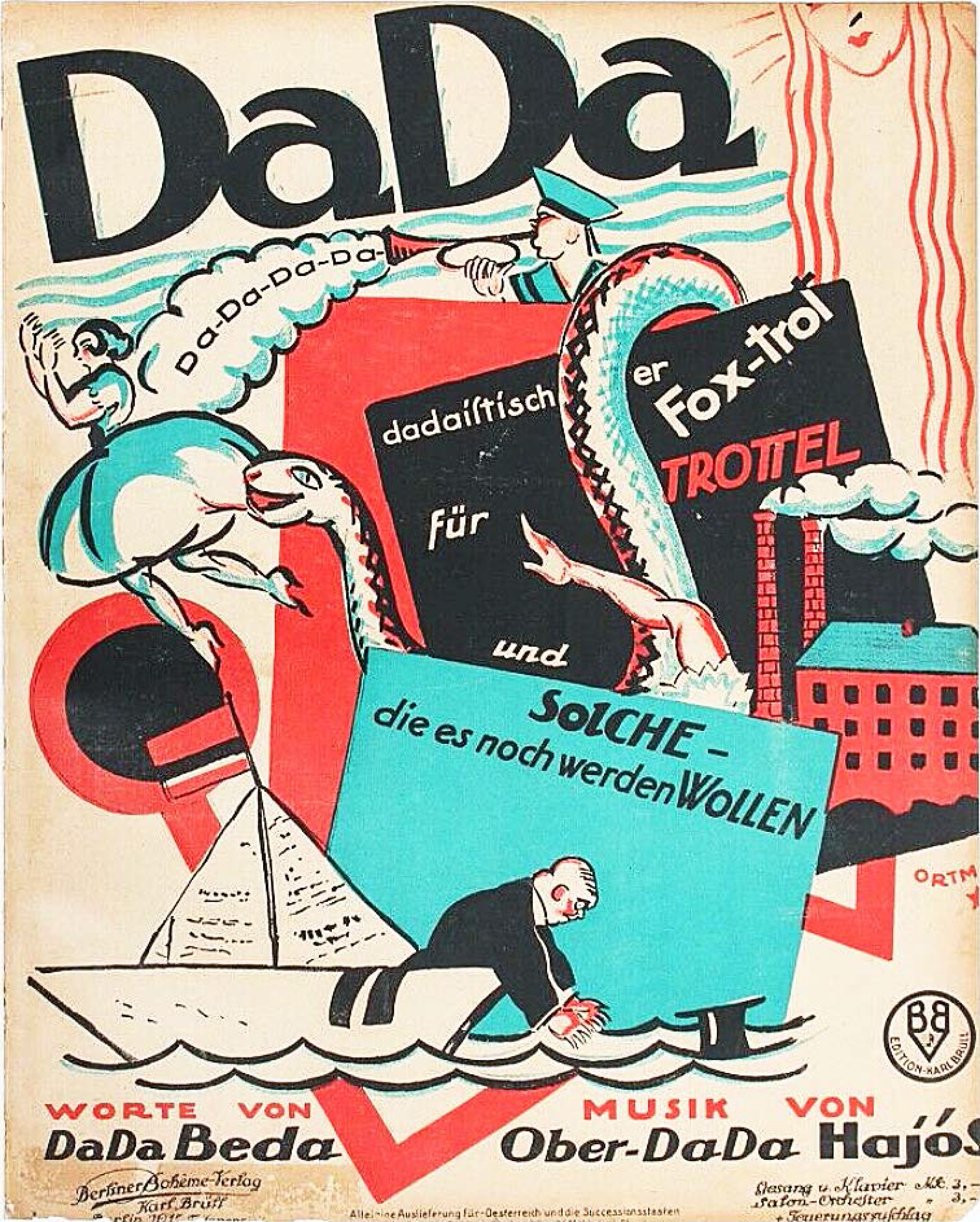 As a huge fan of the songs of the early 20th century AND of the absurd in general, I was particularly intrigued by a rare piece of sheet music called “Dada” that was (and still is as of this writing) being offered for sale on eBay for $2,500! Since they included low resolution images of it, I could play the song to see if it was worth a couple grand, like most songs are.
As a huge fan of the songs of the early 20th century AND of the absurd in general, I was particularly intrigued by a rare piece of sheet music called “Dada” that was (and still is as of this writing) being offered for sale on eBay for $2,500! Since they included low resolution images of it, I could play the song to see if it was worth a couple grand, like most songs are.
Turns out, the music by Karl Hajós was really good, so I had the crazy notion of translating the mostly nonsense, Dada-esque lyrics from the original German into English. After a quick Google translation proved obviously imperfect, I reached out to several people I knew who had studied German and they felt that they were ill-equipped for the task. That’s when the friendly folks over at Reddit took over!
I posted the lyrics to the “r/translator” subreddit, explained the project, and requested translation assistance. Thanks to the able assistance from Jolantha Schnülz, itmustbeluv_luv_luv, and Zoidboig, we then had fairly good direct translations for all of the verses. Getting from a direct translation to a singable English translation was another matter altogether. Because they are nonsense lines, the lyricist was able to write a triple rhyme over the course of 12 syllables; for example: “Jokohama Dalai Lama Ramatama.” I’m happy with my translations (see 3-column translations below), though I am somewhat skeptical that they will ever be sung.
Further research revealed that I was not the first to translate these lyrics into another language. In 1920 Tom Cioffi gave us an Italian version (see below). Cioffi was an Italian librettist who was active throughout the 1920’s and that’s about it. I like to think that I know what the guy went through on this song, and I do feel sorry for him 100 years later if that counts for anything.
All of this is just a preface to exploring the real star of the song, lyricist Fritz Löhner-Beda!
Fritz Löhner-Beda
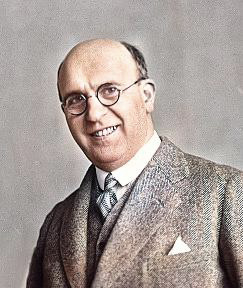
Fritz Löhner-Beda
First the name: Born with the name Bedřich Löwy, which was the origin of his pen name Beda, he grew up as Fritz Löhner, after his family changed their last name when he was 13. So you may find his work credited to to Beda, Fritz Löhner, or Fritz Löhner-Beda. To confuse things even further, the lyrics to “Dada” are by DaDa Beda, just as the music is by Ober DaDa Hajós. (Of course, this added layer of confusion in authorship is all part of the lampooning of the Dada movement which this song is all about.)
Fritz Löhner was a Viennese lawyer in 1908, and two years later he began professionally writing lyrics, poems and other short literary works. By the 1920s, Fritz Löhner-Beda was one of the most sought after lyricists/librettists in Vienna, having made a particularly successful songwriting partnership with Franz Lehár.
Fritz Löhner-Beda was arrested by the Nazis within days of their annexing Austria in 1938, and he was imprisoned at Dachau and in September of that year moved to Buchenwald concentration camp. It was there, late in 1938, that he wrote the lyrics to the song “Das Buchenwaldlied” (“The Buchenwald Song”).
O Buchenwald, I cannot forget you,
because you are my fate.
Only he who leaves you can appreciate
how wonderful freedom is!
O Buchenwald, we don’t cry and complain;
and whatever our destiny may be,
we nevertheless shall say “yes” to life:
for once the day comes, we shall be free!
You can find more on this song here: Buchenwald
Why Löhner-Beda’s musical collaborator Franz Lehár didn’t or couldn’t help free his former lyricist, Lehár being a personal favorite of Hitler, is still unclear. And here I should admit that I have not read the German biographies detailing Löhner-Beda’s life since I have seen no English translations of them.
For three and a half years, Löhner-Beda endured Nazi prison conditions, and age 59 and in ill health, was beaten to death under Nazi orders for not working hard enough at forced labor in the Auschwitz concentration camp.
As if we needed yet another reason to hate Nazism…
The legacy of Fritz Löhner-Beda lives on, though mostly in the German-speaking world. The American public would at least recognize his translated lyrics of the American song “Yes! We Have No Bananas” called “Ausgerechnet Bananen.” And here is an a cappella album dedicated to the works of Löhner-Beda.
You may have heard one of his songs and not even known about it. His song “Das Alte Lied” was featured in the 1949 Orson Welles/Joseph Cotten film The Third Man.
And now his legacy can live on at your very own piano. Print out the sheet music below and sing along to the “Dadaist Fox-Trot for Jerks and Those Who Want to Become Jerks,” as it says on the original sheet music cover. Become a jerk and make Fritz Löhner-Beda proud as you lampoon those surrealists upstarts of the 1920s!
Download the PDF of the simplified sheet music to “Dada” here: Dada
Lyrics to “Dada” by Fritz Löhner-Beda:
Verse 1: Jokohama Dalai Lama
Ramatama Jong!
Sternhimmel Knokebaut
Amtsschimmel
Eselshaut mit Kraut
Botokuden
blaue Buden
alte Juden Gong!
Verträumter See
der Bauch tut weh
es steigt ins Bad
das Welt quadrat
Butterbrod ziegelrot
Goldwolke droht Idiot!
Chorus: Dada o du heiliger
Dada O großmäuliger
Dada erhör mein Gebet
Dada angebeteter
Dada verblödeter
Dada Dada Dada
Gieß uns oh
Mammutgestirn
Sülze ins’ Gehirn
Dada o mephistischer
Dada paralytischer
Dada Dada Dada
Verse 2: Galipoli Molly Dolly
Ganz Manoli Bridge!
Haarnadel Ham and Eggs
Pinselstrich
Farbenklex und Schmecks!
Vaporetto Cavaletto
Tintoretto Kitsch!
Ein grüner Punkt
Der Forstadjunkt
Gemalter Schrei
Spinat mit Ei!
Creosot, bissel
Jod oh Morgenrot! Idiot!
Verse 3: Soziales Nationales
Großer Dalles Bums!
Staatsbund und Bundesstaat
Arist und Demokrat Salat!
Proletarisch deutsch und arisch
alles narrisch Sums!
Gesinnungsmatch
dem Volk die Petsch
oh Politik oh Republik
Huh und Hott Golem
Trat schwarzgelbes Brot Idiot!
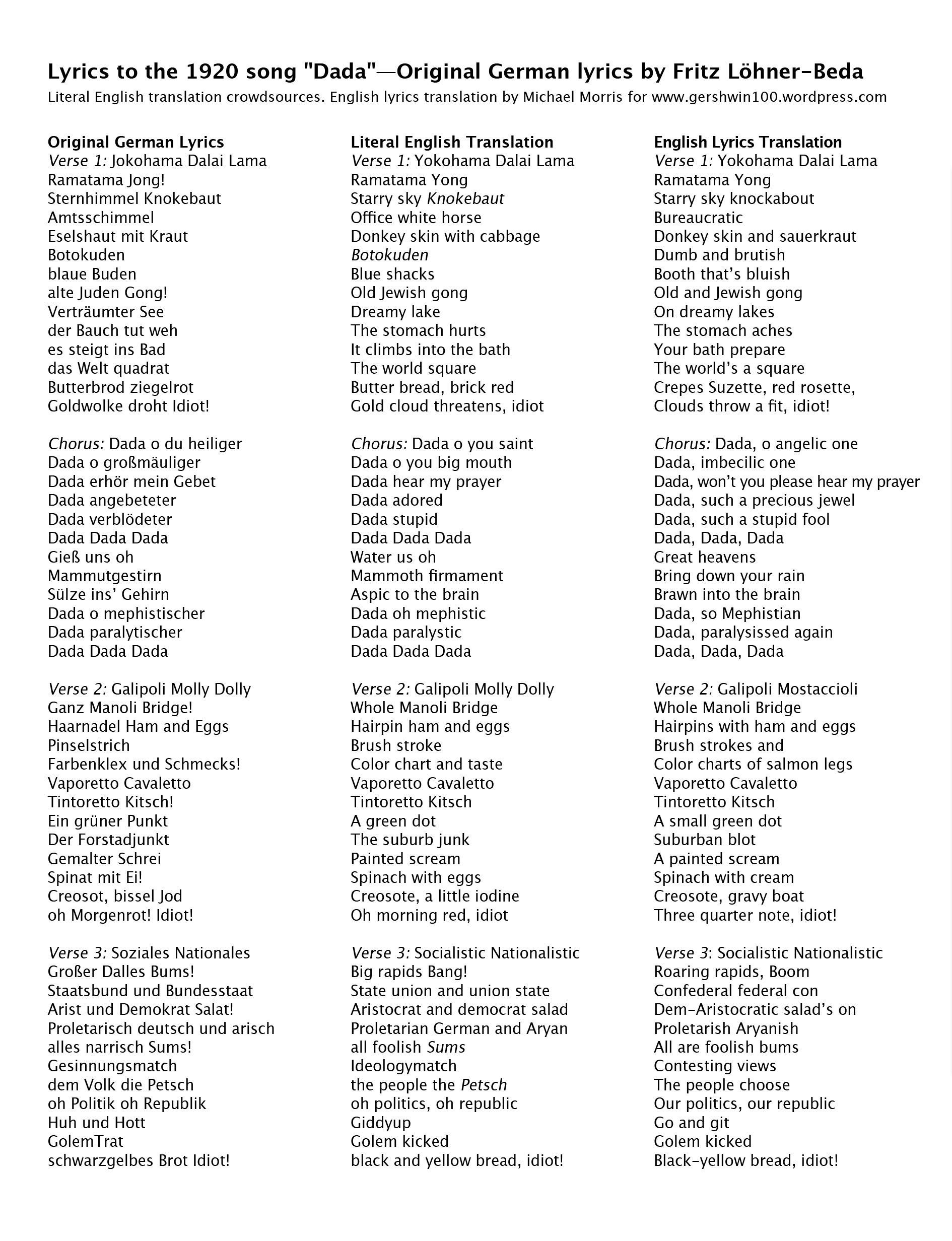
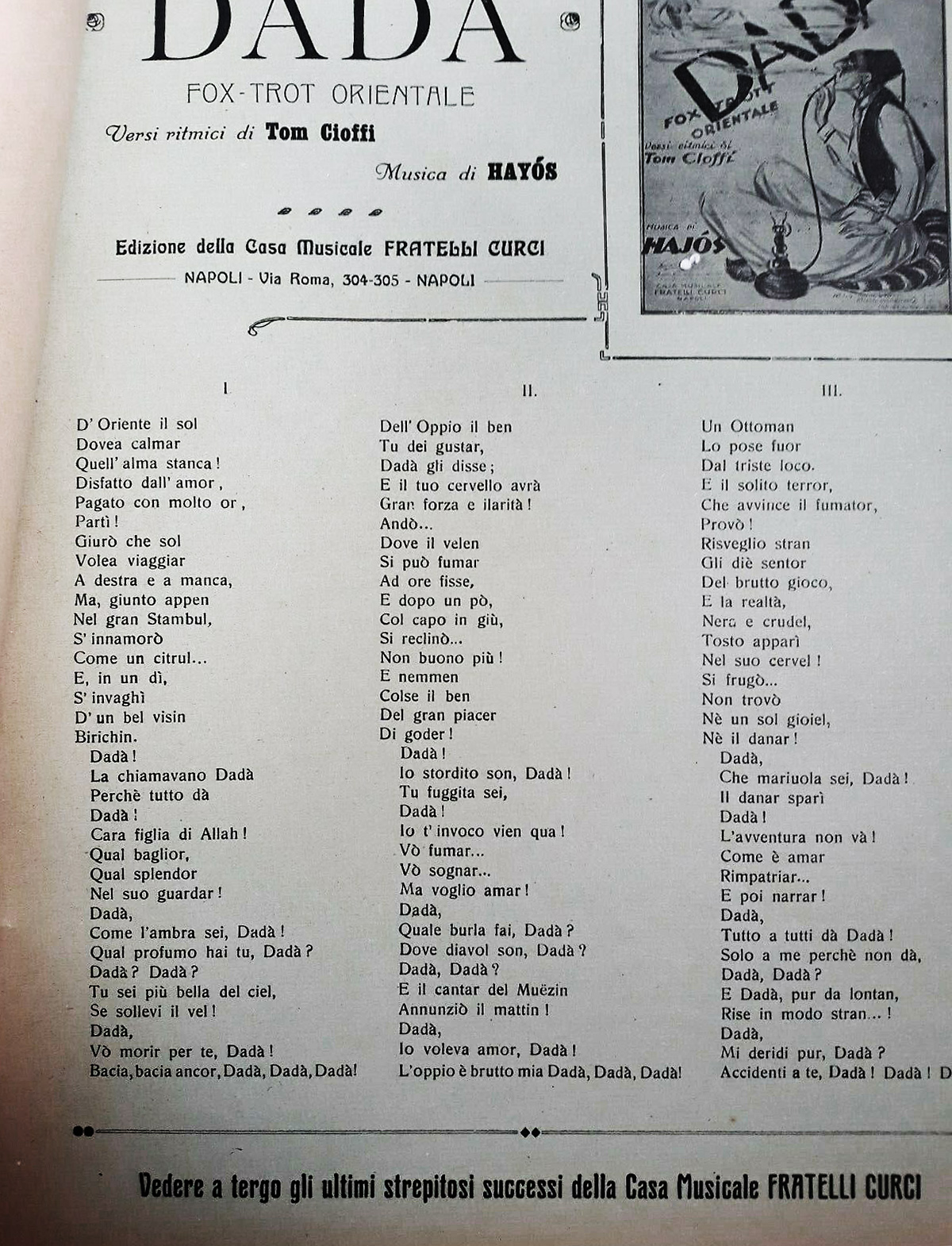
Italian lyrics to “Dada” by Tom Cioffi
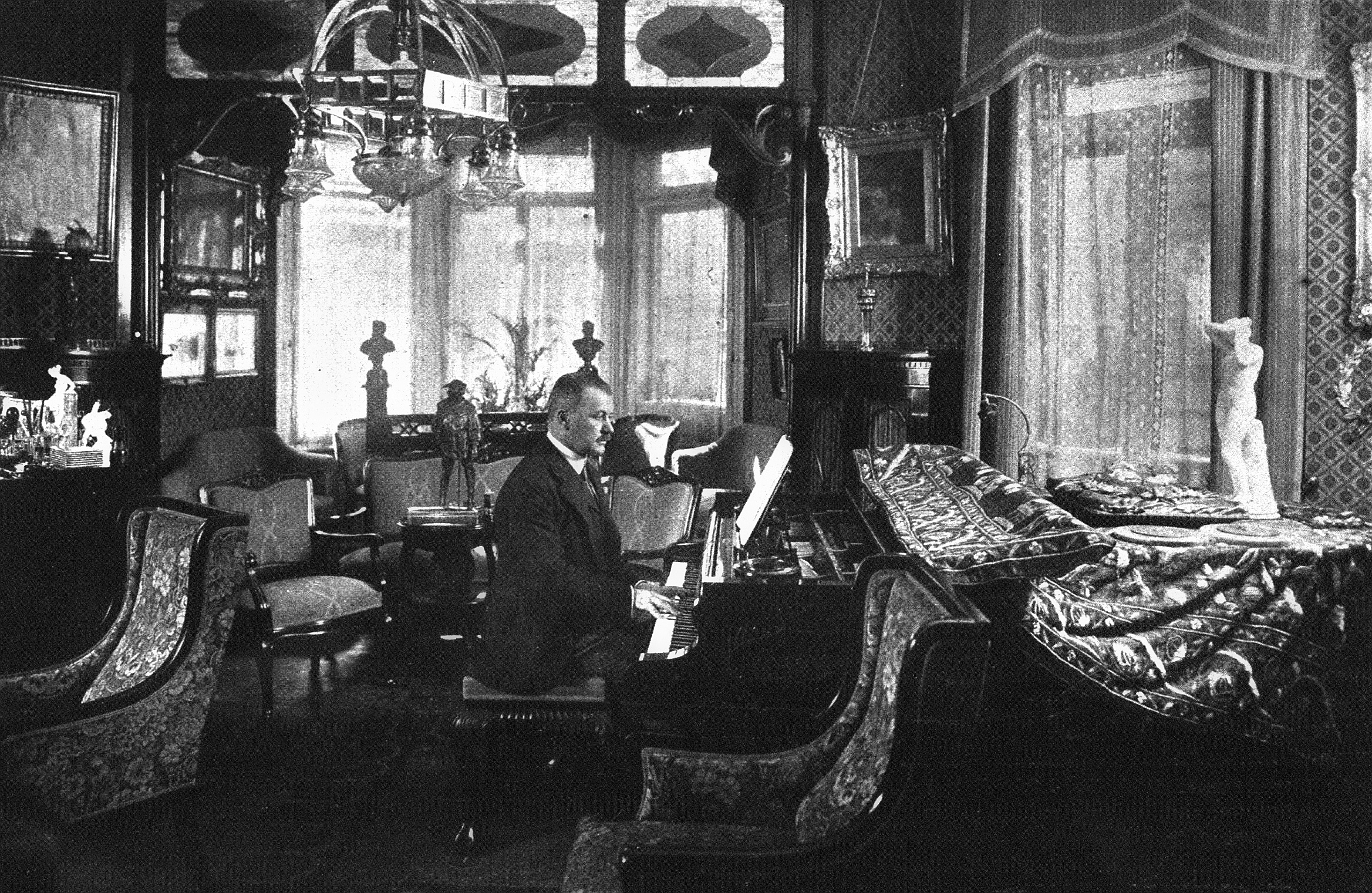
Composer, Franz Lehár at home in 1918
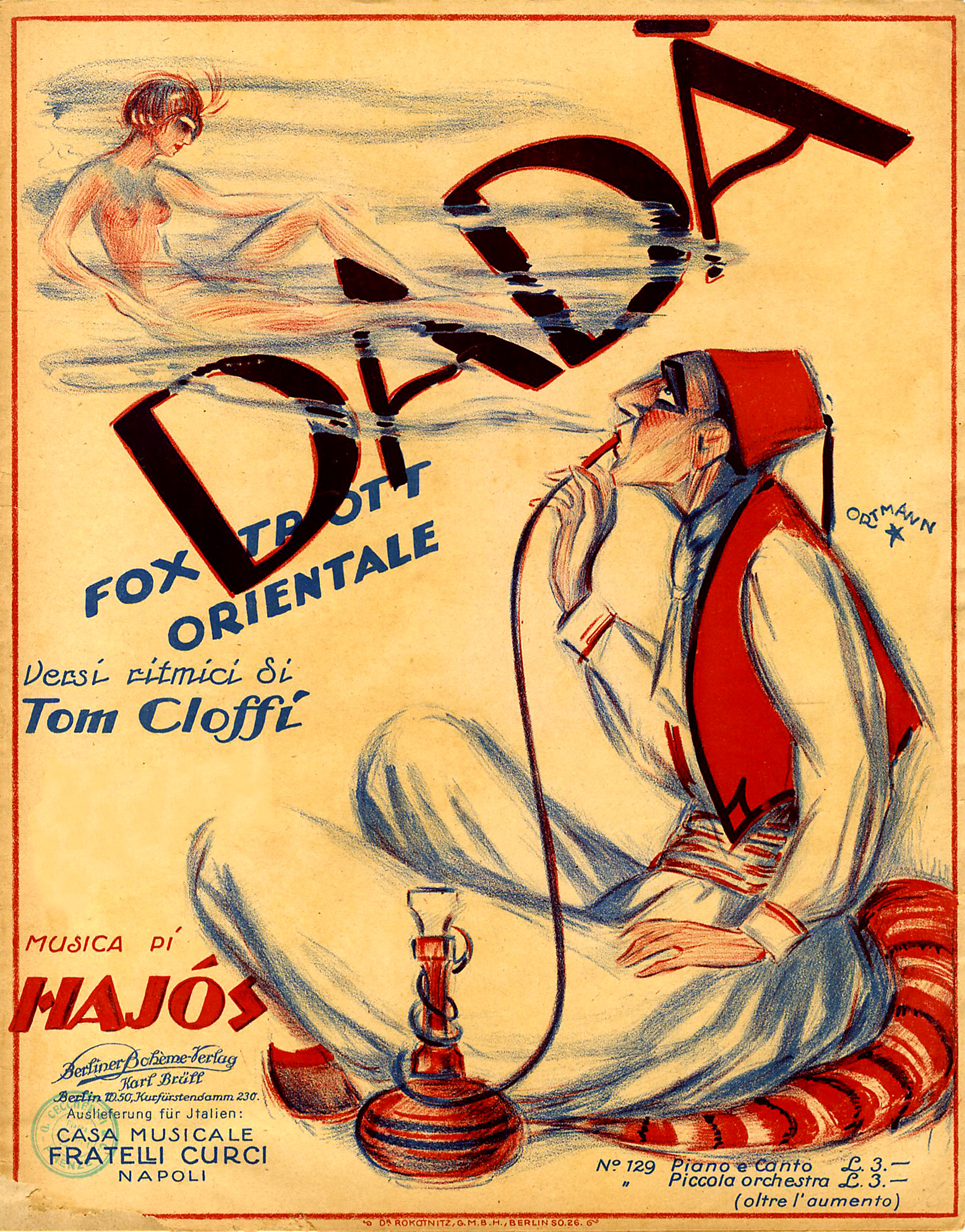
“Dada” (Italian version) sheet music cover illustration by Wolfgang Ortmann

A post especially interesting to me, since the illustrator of both the German and Italian editions of the song was my grandfather, Wolfgang Ortmann (1885-1969). The German version is part of the collection of the National Gallery of Art in Washington, D.C., and is the only one of his several hundred sheet music covers to command a price in the thousands of dollars. (Usually they are $50 or less.) I imagine that its acquisition by the art museum was based on the assumption that Ortmann was a dadaist, which he definitely was not. (The Italian version, presumably reflecting the unlikelihood of people in Italy knowing about dadaism at the time, is much more his style.) In his day — the early and mid-20’s — he was the most prolific of German sheet music illustrators, along with Telemann, Herzig, and Dely. His work opportunities dried up under the Nazis, as he refused to abandon his fourth wife, who was Jewish. (My grandmother was his second wife.)
LikeLiked by 1 person
Thanks for checking in and giving more details on your grandfather. Both versions of the cover art are great and pretty wild, as they should be.
LikeLike